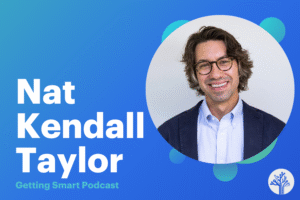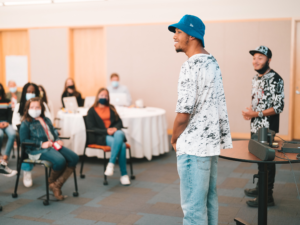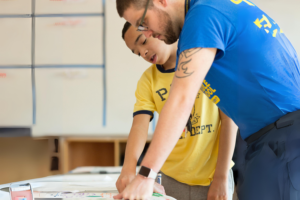Empowering Student Voice to Drive Change
Key Points
-
Developing structures like the Student Voice Council enables students to actively participate in district policy-making, fostering a sense of ownership and empowerment.
-
By involving students in initiatives like Mental Health Week and Board Town Halls, schools can create lasting impacts on community engagement and student well-being, while preparing future leaders.

By: Luanna Huang and Ezra Rottman
Young people are the voice of our next generation, and their role in shaping the world cannot be overstated. Among these critical voices is the Student Voice in Education, a driving force in elevating a school district. In July of 2022, Yakima School District brought together a group of students who would become leaders in advocating for student voices within our system. You may wonder why student voice in education is so important. To that, we ask: “Who do you serve in your district?” The only correct answer is students. Teachers should be invested in their students and their success, otherwise, why teach?
Each year, as school resumes, we see new faces in our district and, with that, new ideas that often escape adults in the system. It is the responsibility of a district to create the conditions where children can become change-makers, leaders, and creators of the future. What better way to achieve this than to integrate student voices into the decision-making processes within your district? We must remember that the primary goal of every adult working in education is to equip students with the knowledge and skills they need to confidently take on the world upon leaving the district.
With this in mind, we would share with you how we, as students, have led to ensure long-term student voice structures for our district.
What We Have Created in the Yakima School District
Our role as student leaders is diverse, encompassing everything from policy development to hosting events on critical issues like mental health. Our first major project, which brought together our team, was the development of a Yakima School District Student Voice Policy. Initially, our team consisted of five members. We spent long summers and sacrificed many Sunday afternoons for two years straight to discuss, plan, and create policy points that were deeply important to us.
Throughout the process, we gathered feedback from administrators, staff, teachers, students, and community members inside and outside of our town. We had also rebranded the Superintendent Student Advisory Council to become the Student Voice Council (SVC), a group of approximately 30 students who joined us each month to work on various student-identified issues such as mental health, nutrition, voting, and credits required to graduate.
One of the council’s significant achievements was the creation of Mental Health Week. Our team prepared a Mental Health Proclamation that was recognized by our school board. It dedicates the first full week of May to mental health awareness. Each day of that week in 2024, we hosted events addressing different mental health issues such as depression, anxiety, drug use, eating disorders, and much more. We had activities that included Kahoots, a mental health walk at the park, and we even had guest speakers come talk to students about mental health and how to regulate it. This entire week was the work of our council and team. Our goal was not merely to “do something” but to show our community that, as students, we were there for them, and we wanted our students to feel seen and heard.
Another crucial initiative was the Board Town Hall, which we organized during the school board election cycle. We invited board members to our town hall, hosted at the Capitol Theater in Yakima, to address questions from our community. We ensured the event was recorded so that others who couldn’t join us wouldn’t miss out. This engagement with the board isn’t just a one-time thing; we also make sure to intentionally attend board meetings to ensure consistent student voice.
We are also preparing the next generation of students and empowering them to create something that they care about. Our goal is to establish a lasting system that supports students to be the change they want to see.

How to Do it Right
In our experience, it’s proven important that student voice be a two-way partnership, rather than a one-way feedback channel. Our Student Voice Council, for example, is entirely student-driven, allowing students to steer the conversation in the direction of what is important to them. Agendas are created with space for brainstorming and open dialogue, rather than existing as singular opportunities for students to give input on district-selected issues. It’s a step in the right direction for districts to listen to their students, but trusting your students to make the change where they think it’s important is an actionable leap that few districts embrace. For example, our Mental Health Awareness Week sprouted from simply surveying students on what they thought were important educational issues that needed solving. It then evolved into a plan for a district week, which became an official School Board proclamation.
At this point, many districts around the nation have added space on their Board for one or two non-voting, student members. Again, it’s great that they’ve added a seat for students to share their opinions; however, school boards may believe that this symbolic action is representative of a wide swath of students. It is not…. . It’s easy to check the box, to say, “We’ve realized student voice.” There are a few issues that arise when one or two student board members represent student perspectives across a district. It is incredibly difficult for one or two students to represent the thinking and opinions of thousands. In our model, our Lead Fellow students have access to the wider student voice council. The structure to meet and speak with a diverse body of students from across the district allows us to inform what we take to Board meetings. Furthermore, when students drive the change that they want to see, it empowers them to take initiative, grow in their skills, and realize their change-making potential on a scale that’s impossible in a feedback position.
One issue that we’ve faced, and currently face, is that of student interest and retention. It’s difficult to gather and keep passionate students, especially when they’re only around for four short years. That being said, we have a few tips to overcome this obstacle:
- Get started. The system will not fully make sense in the beginning. We joined this work as freshmen because we were curious and passionate about making change. We didn’t have a clue about policy governance, we didn’t know our Board and district leadership by name, and we certainly didn’t think we had the capacity to write and pass a district policy. It would be difficult to find young high schoolers who are policy experts; it’s not nearly as difficult to find dedicated, curious high schoolers who are eager to make it happen.
- Look everywhere. The young leaders that you’re looking for might not be where you expect them to be. When we recruit students for the Student Voice Council, we go everywhere. Instead of presenting only to the student government and honors classrooms, we advertise in the lunchroom, hallways, and by posters online. This ensures that we’re able to reach any student who is eager to be a part of this work. When we look for students to lead the Student Voice Council (SVC), we look for students who’ve shined in the SVC.
- Incentivize intentionally. When the Student Voice Council is recruiting, we advertise the opportunity for personal growth, the power to make real, lasting change, and the space to discuss issues and rectify issues that students care about. By doing this, we attract students who will make the most of the opportunity.
- Create lasting change. Our Student Lead Fellows engaged over 1,000 people in our district to pass the Student Voice Policy that will outlive our tenure and those of the adults in our district. The Yakima School District Policy 0580 now holds the superintendent, and therefore the system, accountable for engaging student voices authentically over time. You can read our policy here, and we’d love to talk with you about how to bring this work to reality in your district!
We’d like to make a special thank you to our incredible Yakima School Board – Norm Walker, Graciela Villanueva, Martha Rice, Ryan Beckett, and Raymond Navarro. We also thank our Superintendent, Dr. Trevor Greene, and College Spark Washington for investing in our work. They are incredible examples of what it looks like when adults truly value student voice and let students lead!

Conclusion
Luanna: Working in student voice has been a rare and transformative opportunity, one that not every student receives. I am so thankful to have had the opportunity to support other students by ensuring that their voices in education are heard. As our generation advances, I see education as a crucial force in enabling students to take charge of their futures. I have always held the belief that education is what propels you forward. I admire that this district took on the initiative to push for student voices in shaping our district and what we as students are capable of learning.
My involvement in Student Government has been a constant throughout my life, but making an impact across the entire district has been a unique honor. This experience not only deepened my understanding of leadership but also shaped my vision for the future. I now know that my work in student voice has inspired a lifelong commitment to education and philanthropy. I aspire to build schools in underserved regions like the Congo and Cambodia because I believe education should be a right for all children, regardless of where they are born. My journey as a student leader has shown that even small actions can create global change.
Ezra: I truly believe that within the next 10 years, there will be students all over the nation who’ve risen up to make changes in their school community. It will be normal for districts and schools to encourage and empower their students to be partner decision-makers. I hope that the work Yakima has started continues to spread and impact this future.
By getting hands-on experience working with policy and local government, I’ve confirmed my interest in public policy/law and gained skills I’ll use in the future. I’ll be much more prepared for college and my career afterward. By working to represent students within district structures, I have improved as a speaker and become a better listener. By presenting this work to hundreds of people at a time, I’ve ditched my stage fright and gained confidence. By going out and doing this work, I’ve become a better student, speaker, leader, and person.
Luanna Huang and Ezra Rottman are students in Yakima School District.








0 Comments
Leave a Comment
Your email address will not be published. All fields are required.